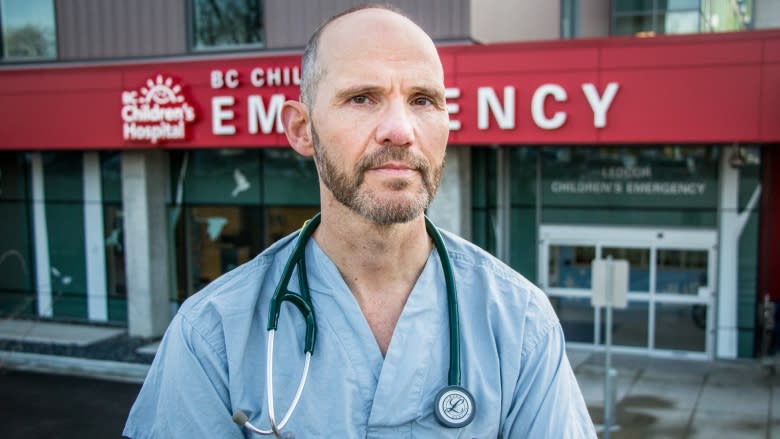'We've got a problem here': B.C. civil liberties group concerned doctor fingerprinted to prove his identity
The B.C. Civil Liberties Association and Doctors of B.C. are raising concerns after a physician was told he had to be fingerprinted to prove he wasn't a sex offender with a similar identity.
Dr. Joseph Copeland said he was told that if he refused, he would face professional sanctions, including the loss of his right to practise medicine.
Copeland believes he'll soon have company.
He predicts all doctors and nurses in Canada will be required to be fingerprinted in the near future — a suspicion the RCMP appears to confirm in an email to CBC News.
"Why are we being pulled aside as if we were criminals?" said Copeland. "I don't think the doctors know this. I think this is gonna come as a big surprise."
Copeland, 52, is an emergency room physician at both B.C. Children's Hospital and Richmond Hospital.
In that role, he said, he has willingly complied with a "vulnerable sector check" every five years.
But he discovered there has been a change in the standard criminal record check for medical professionals and others working in the vulnerable sector — especially doctors who treat children or vulnerable adults, including the elderly.
He said since almost all doctors have patients who could be deemed "vulnerable," he predicts the fingerprinting requirement will soon apply to all medical professionals in the country. And, he said, that's an infringement of their civil rights.
"We all have an interest in protecting the kids of British Columbia — nobody more so than the doctors and nurses at B.C. Children's Hospital," said Copeland.
"But we also have an interest as professionals and citizens in protecting our own civil rights, and any infringement should be really justified in order to do this."
Fingerprint request sent by mail
In the past, Copeland said, his identity and clean criminal record were easily established with a simple check of his passport and provincially issued medical and driver's licences.
This fall, he received a "fingerprint request" letter in the mail from B.C.'s Ministry of Public Safety.
When he demanded an explanation, a followup letter in late December from the ministry stated its Criminal Records Review Program had implemented the RCMP's Canadian Criminal Real Time Identification Services (CCRTIS) "vulnerable sector policy."
"As of November 30, 2017, any applicant that shares a similar combination of name, gender and date of birth as a pardoned sexual offender will be requested for fingerprints," wrote Meghan Oberg, deputy registrar of the CRRP. (In a subsequent email to CBC News, the ministry revised the inception date to November 2013.)
In the letter to Copeland, Oberg warned that failure to comply with the request would result in his file being closed and his clearance not being issued.
Since his criminal record check would be incomplete, Copeland was advised the body that regulates the province's medical profession — the College of Physicians and Surgeons of B.C. — "may take further action."
The college has the power to impose professional sanctions, including limiting or revoking medical licences, but says it "plays no part in determining which doctors should be fingerprinted."
Copeland said he "felt sick" when he first got the fingerprint notice — "like someone wrongly accused of a crime."
"My identity is well known, my height, my weight, my gender, my eye colour, my passport, my licence. None of that has changed, so what's new that suddenly I have to come in and be fingerprinted like in a criminal lineup?" said Copeland.
"To me this is a case of government overreach without adequate oversight."
'We've got a problem here'
The BCCLA agrees with Copeland's concerns.
"I think he's right, the sense of we're not exactly sure what's happening behind the curtain here," says policy director Micheal Vonn.
"The RCMP have got a problem on their hands when ordinary law-abiding individuals think that they're being ganged up on, that this is merely an exercise to normalize the process of broad-based biometric screening," Vonn said. "Completely non-conspiratorial people have asked this question. So, yes, we've got a problem here."
The BCCLA said it will "absolutely consider" challenging the provincial government over the fingerprinting requirement.
The Doctors of B.C., an advocacy organization which represents 14,000 physicians, residents and medical students in the province, is also concerned about some aspects of fingerprinting of its members.
Association president Dr. Trina Larsen Soles says the process "is not without its flaws."
"We would like the RCMP process to be more transparent — sometimes it's not clear the specific reason for the fingerprinting request," said Larsen Soles. "If in the future the RCMP … deems it necessary to fingerprint everyone, then doctors should comply. If it is beyond what would be considered a good reason, then problems may arise."
'Fingerprints will be required': RCMP
The RCMP seemed to back up Copeland's belief that fingerprinting of all medical health professionals will be mandatory in the near future.
When questioned by CBC about the fingerprinting of doctors, national RCMP spokesperson Sgt. Marie Damian said "the [current policies] will be updated once the RCMP criminal records systems are fully automated and fingerprints will be required for all criminal record and vulnerable sector verifications."
Copeland, faced with possible disciplinary action, has now complied with his notice.
He recently walked into the Vancouver Police Department and was fingerprinted — then quickly cleared of any connection to the sex offender with a similar identity.
Besides the $60 charge for the fingerprinting, he says there was another cost.
"If I spend a half day here, that's 10 or 12 more kids that I'm not seeing in the emergency department while I take time off work to come down here to prove one more time who I am," Copeland said.
"So it's kinda crazy."



